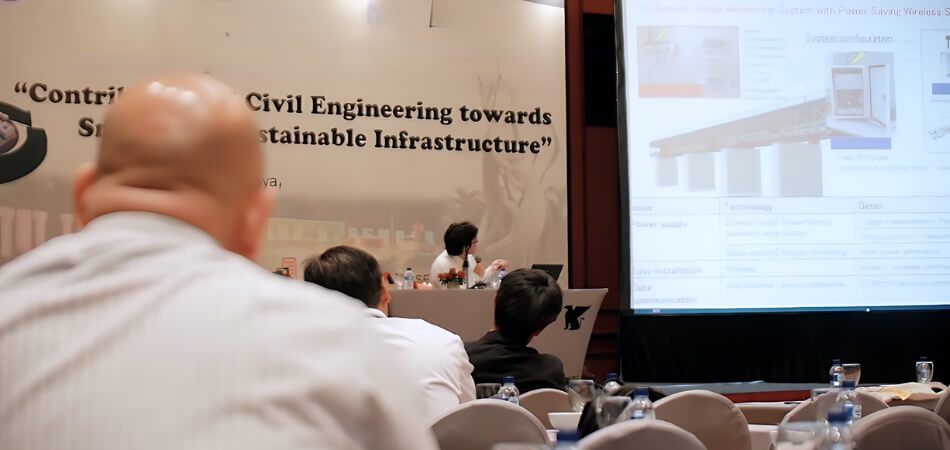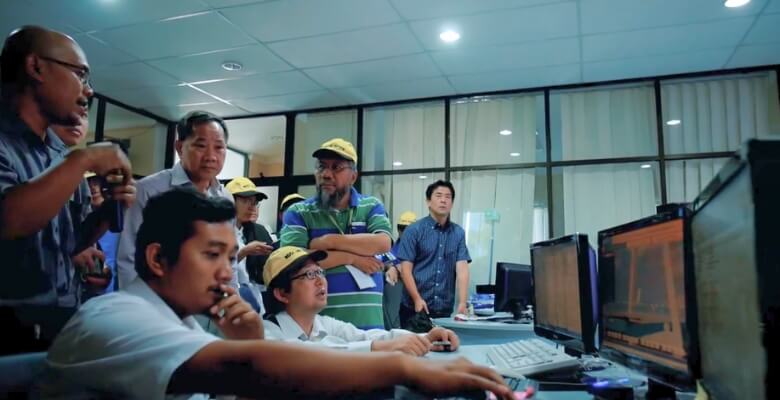An industry conference might look something like this: professionals exchanging ideas, networking over coffee, and learning the latest trends. But what about a gathering specifically intended for civil engineers? Knowing what happens at a civil engineering conference can help you understand it properly.
Well, it’s a dynamic hub where experts gather to share the latest research, dissect industry trends, forge invaluable connections, participate in hands-on workshops, and learn about innovative technologies changing the field.
From riveting keynote speeches to collaborative sessions, these conferences offer a glimpse into the future of civil engineering. The rest of this article explores the buzzing world of Civil Engineering Conferences if you’re curious about the inner workings of this industry.
What Does the Civil Engineering Conference Entail?
The Civil Engineering Conference offers an engaging platform for professionals to exchange insights and advancements in their fields. Attending this event exposes participants to innovative projects and innovative technologies in civil engineering. Networking opportunities abound, allowing attendees to connect with peers and industry leaders from around the globe. Through workshops and keynote speeches, participants gain practical skills and knowledge that are immediately applicable.

One of the highlights is the chance to hear about global projects at the international civil engineering conference. Here, experts discuss sustainability practices and the future of infrastructure development. These discussions help professionals understand the challenges and opportunities in civil engineering today. The conference also includes sessions on regulatory changes and safety standards, ensuring that all attendees are up-to-date with the latest industry requirements.
What Happens at a Civil Engineering Conference?
Conferences offer professionals insights into the latest industry trends and innovations through an interactive learning environment. A civil engineering conference is designed to accommodate a variety of interests within the field, ensuring there’s something valuable for every attendee.
Presentations and Keynotes
Expert speakers share their most recent findings and innovative solutions, tackling the biggest questions in civil engineering today. These sessions highlight groundbreaking projects and theoretical approaches that are influencing the future of the industry. Additionally, keynote speeches provide strategic insights from leading figures, discussing long-term industry trends and their potential impact on global infrastructure.
Workshops and Seminars
Workshops offer practical, hands-on experiences where attendees can learn about the latest construction materials and techniques. They provide a deeper understanding of topics such as sustainable practices or the implementation of advanced modeling techniques. Seminars complement these with expert-led discussions that go into detail about technical challenges and the latest research findings.
Panel Discussions
In these discussions, panels composed of industry experts explore the various challenges currently impacting civil engineering. They debate solutions and share insights on how to overcome these issues effectively. This format encourages a multidimensional view of problems, fostering a comprehensive understanding among participants.
Exhibitions and Demonstrations
This part of the conference showcases the latest technologies and tools that are revolutionizing civil engineering. Exhibitors present new products and software that can significantly enhance project efficiency. Live demonstrations provide practical examples of how these new technologies can be applied in real-world scenarios, offering attendees a first-hand look at their potential.
Networking Opportunities
These events provide a platform for establishing new professional relationships and strengthening existing ones. Formal networking sessions are structured to introduce attendees to industry leaders and potential collaborators. Informal gatherings, such as dinners and social outings, offer additional opportunities for more relaxed conversations and connections.
Poster Sessions
Researchers and students have the chance to display their work in a visual format, which facilitates in-depth discussion and feedback. This setting allows for personalized interaction and detailed exploration of new research, making it invaluable for both presenters and attendees. Poster sessions are vital for disseminating new ideas and developing collaboration among emerging scientists and engineers.
Competitions and Awards
Competitions inject a spirit of innovation and challenge into the conference as participants vie for recognition of their work. Awards ceremonies acknowledge outstanding achievements, celebrating the creativity and diligence of professionals and students alike. These accolades not only honor current successes but also inspire ongoing efforts in civil engineering research and practice.
Civil engineering conferences play a crucial role in the professional development of attendees, providing a rich array of educational and networking opportunities. By participating in these events, professionals and students alike can stay at the forefront of their field, continually enhancing their knowledge and skills.
Who Should Participate at Civil Engineering Conferences?
Civil engineering conferences are essential hubs for professional development and networking within the industry. These gatherings not only enhance knowledge but also connect various stakeholders from academia, government, and the private sector. Attending these events can significantly advance a participant’s career and understanding of civil engineering.
Civil Engineering Students
Students majoring in civil engineering can gain invaluable exposure to industry practices and emerging technologies at these conferences. They have the opportunity to meet potential employers and learn from seasoned professionals, which is crucial for their career development. Additionally, participating in these events can help them understand the practical applications of their academic studies. For students, these conferences are not just learning experiences but pivotal networking opportunities.
Academic Researchers and Educators
Academic professionals find civil engineering conferences instrumental in keeping abreast of research advancements and educational methodologies. They can present their work, garner feedback, and engage with peers to discuss future collaborative opportunities. Such interactions are vital for refining research and enhancing teaching approaches. These events also serve as a platform for educators to learn from industry practices, integrating them into their academic curricula.
Professional Civil Engineers
For professional engineers, these conferences are crucial for continuing education and professional certification. They provide updates on industry standards, new technologies, and regulatory changes. Networking with other professionals offers opportunities for job advancement and project collaborations. These are some of the key reasons to attend civil engineering conferences, making them indispensable for career growth.
Industry Leaders and Executives
Executives and industry leaders attend these conferences to ensure their companies remain competitive and aligned with the latest industry trends. They can explore new business opportunities and technologies that may benefit their operations. Additionally, these conferences allow leaders to contribute to shaping industry standards and practices through discussions and panels.
Government Officials and Policy Makers
Government representatives involved in civil engineering projects attend to understand the implications of technological advancements and regulatory changes. These conferences provide them with insights into industry challenges and needs, which is essential for informed policymaking and infrastructure development. Engaging with professionals helps align government actions with industry standards and advancements.
How to Find the Right Civil Engineering Conference to Attend?
You can significantly improve your professional development and networking opportunities by attending the right civil engineering conference. These conferences vary in focus, size, and audience, making it essential to select one that aligns with your career goals and interests. Here’s a practical guide to help you choose the most appropriate conference:
Step 1: Identify Your Objectives
Before searching for a conference, clearly define what you hope to gain from attending. Are you looking to learn about the latest technological advancements, or are you more interested in networking opportunities? Understanding your goals will guide your search and help you choose a conference that aligns with your professional needs. This clarity will ensure the event provides value relevant to your career aspirations.
Step 2: Research Conference Themes and Agendas
Look up potential conferences and examine their themes, agendas, and the profiles of keynote speakers. Conferences often focus on specific areas of civil engineering, such as structural dynamics, environmental concerns, or transportation infrastructure. Reviewing the agenda will help you understand the focus of the conference and whether it matches your interests. This step is crucial in filtering out events that don’t align with your professional or academic focus.
Step 3: Consider the Networking Opportunities
Evaluate the networking potential of the conference. Check if it attracts attendees who are influential in your area of expertise, including potential employers, collaborators, or thought leaders. Some conferences offer structured networking sessions, which can be particularly valuable. These opportunities can be a significant consideration, especially if building professional relationships is one of your main objectives.
Step 4: Assess Logistical Details
Finally, consider the logistical aspects of the conference. These include the location, date, and cost, including travel and accommodation expenses. Make sure attending is feasible within your budget and schedule. Also, look into any potential discounts, scholarships, or early-bird registration benefits that could make attendance more affordable.
Choosing the right civil engineering conference requires careful planning and consideration but can be immensely beneficial for your career. By following these steps, you can ensure that the conference you attend not only meets your professional needs but also offers significant personal and professional growth opportunities. Take the time to research thoroughly and choose wisely to make the most out of your conference experience.
Registering for a civil engineering conference is the first step toward accessing a wealth of knowledge, networking opportunities, and professional growth. Follow these simple steps to secure your spot:
What Impacts Does a Civil Engineering Conference Have on its Attendees?
Civil engineering conferences are more than just gatherings; they are significant events that can profoundly influence the careers of their attendees. By facilitating knowledge exchange, networking, and exposure to the latest industry trends, these conferences impact the professional field of civil engineering. Attendees leave with valuable insights and new tools to enhance their work and careers.
Knowledge Enhancement
Attending a civil engineering conference equips professionals with the latest knowledge in the field. Workshops, presentations, and seminars provide updates on new research, innovative materials, and advanced construction techniques. This continuous learning helps attendees stay competitive and knowledgeable. Such engagement ensures they remain at the forefront of industry developments.
Networking and Collaboration Opportunities
Conferences serve as an excellent platform for building professional relationships. They connect attendees with peers, mentors, and industry leaders, which can lead to future collaborations and job opportunities. These connections often prove invaluable, providing support and opening doors throughout one’s career. Networking also helps in sharing challenges and solutions, enriching the professional experience of each attendee.
Innovation and Inspiration
Exposure to new ideas and technologies at conferences can spark innovation among civil engineers. Seeing successful applications of new technologies and methodologies can inspire attendees to implement similar strategies in their own projects. This exposure is essential for enhancing creativity and pushing the boundaries of what is possible in civil engineering. Moreover, it encourages professionals to think outside the box and bring innovative solutions to their work.
Professional Development
Conferences contribute significantly to professional growth and career advancement. They often offer certification or continuing education credits that help professionals meet licensing requirements. The experience also enhances a resume, showcasing an ongoing commitment to education and professional excellence. Such credentials are important for career progression and establishing credibility in the field.
Impact on Project Design
Professionals learn about the latest best practices and technological advancements that can be directly applied to their projects. These events highlight the benefits of civil engineering conferences on project design by showcasing advanced techniques and tools. This knowledge transfer is crucial for improving the quality, efficiency, and sustainability of project designs. It ensures that engineers can continually improve their contributions to infrastructure development.
Civil engineering conferences have a lasting impact on attendees, shaping their approach to engineering challenges and broadening their professional perspectives. By participating in these events, engineers not only advance their knowledge and skills but also contribute to the vibrancy and innovation of their profession. Make sure to choose a conference that aligns with your goals to maximize these benefits.
FAQs for What Happens at a Civil Engineering Conference?
Attending a civil engineering conference can be a valuable experience for professionals in the field. These events are packed with activities that promote learning, networking, and innovation. Below are five frequently asked questions to help you understand what to expect at such a conference.
What Types of Presentations Occur at a Civil Engineering Conference?
Presentations range from detailed case studies and the latest research findings to overviews of large-scale projects. Speakers include both seasoned professionals and new researchers eager to share their insights and advancements.
Are There Opportunities for Hands-On Learning at These Conferences?
Yes, many conferences offer workshops and seminars where attendees can engage in hands-on activities. These sessions are designed to teach new techniques and technologies through practical, interactive learning experiences.
What Role Do Panel Discussions Play at Civil Engineering Conferences?
Panel discussions provide a platform for experts to debate current challenges and future trends in civil engineering. These sessions facilitate an exchange of ideas and offer diverse perspectives on complex issues facing the industry.
Can I Expect Networking Opportunities at a Civil Engineering Conference?
Absolutely, networking is a key component of these conferences. Structured networking events, social mixers, and informal gatherings provide ample opportunities to meet industry peers, find mentors, or discover potential collaborators and employers.
Are There Any Special Events or Features Unique to Civil Engineering Conferences?
Many conferences include exhibitions where companies showcase the latest tools, technologies, and materials. Additionally, some conferences host competitions and awards ceremonies to recognize outstanding contributions to the field.
Bottom Line
To truly understand the changing environment of civil engineering, attending a conference is invaluable. These gatherings showcase the latest in innovation and offer unmatched networking opportunities. Every session is a chance to learn something new and meet people who can help shape your career. They provide a clear picture of the industry’s direction and the advances that are being made.
Understanding what happens at a civil engineering conference will significantly enhance your knowledge and connections. By engaging with new ideas and technologies, you place yourself at the frontier of the field. Hence, these events are key stepping stones for personal and professional development.







